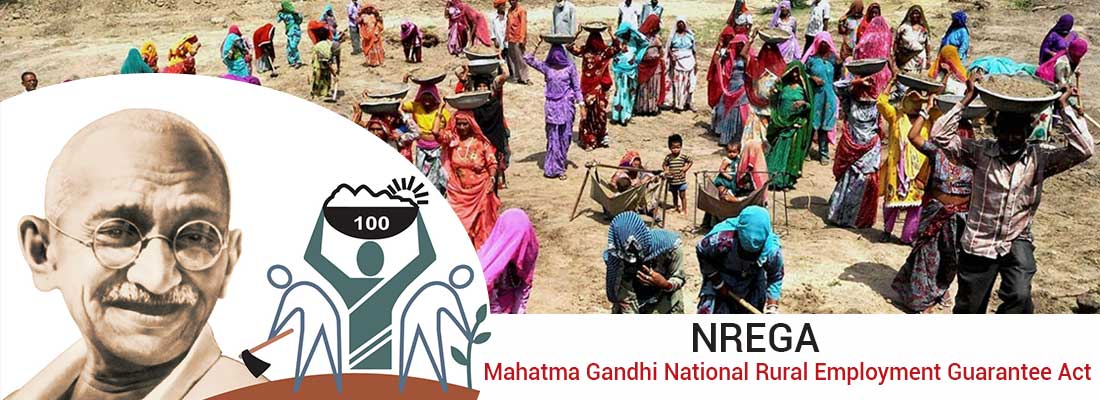Rural Employment Guarantee Scheme – Economics Notes – For W.B.C.S. Examination.
Indian Economy and Economics is considered as the significant part of the WBCS Exam. It is a relevant subject for W.B.C.S. Prelims Exam as well as rather for Main and Interview too.Economics is considered as a tough optional compared to other optional subject. If the aspirant is a graduate in Economics, then all that you need to cover the concepts and theories first. After that aspirants have to work on current affairs, additionally to give a final touch as per the W.B.C.S. Exam syllabus.The Government of India introduced the National Rural Employment Guarantee Act in 2005 which was later renamed to Mahatma Gandhi National Rural Employment Guarantee Act.Continue Reading Rural Employment Guarantee Scheme – Economics Notes – For W.B.C.S. Examination.
This Act is a social security scheme that aims to provide livelihood, sustenance and employment to the rural communities and labourers in India. The NREGA assures income security to rural families and provides a minimum of 100 days of definite wage employment in one year. This wage employment is applicable for adults who have volunteered for unskilled manual labour. The NREGA was passed as an Indian labour law and was implemented in 200 districts across India on 2nd February, 2006. More districts were covered across the country later from 1st April, 2008. This scheme has been implemented on a very large scale and the World Bank even mentioned the NREGA as an excellent example of rural development in the World Development Report of 2014.
Under the MGNREGA, any rural adult non-skilled worker can get a minimum 100-day job guarantee, every financial year. Every Indian rural citizen is entitled to receive employment within 15 days of registering under this scheme. Once the registration has been done, the worker is eligible for an unemployment allowance from the Government as well, if employment has not been found within the stipulated period. The Gram Panchayats were nominated to implement the MGNREGA across India. Initially, the minimum wages that were to be given to labourers was Rs. 100 per day. The Government of India revised the wages on a later date in accordance to state labour employment conventions. Currently, the minimum wages are being determined by the State Government, with the Rs. 163 being the minimum in Bihar and Rs. 500 being the minimum in Kerala. The National Rural Employment Guarantee Act of 2005 is effective in all states across India, except Jammu and Kashmir.
NREGA Objectives
As per the scheme, the following are the core objectives –
- To provide atleast 100 days of guaranteed non-skilled manual employment to rural workers every year, so that rural households are able to sustain themselves.
- The core aim of the NREGA scheme is to ensure that there is a source of livelihood for the economically weaker section of the population.
- The NREGA also aims to proactively include the weaker section into the society.
- This scheme also targets to strengthen Panchayati Raj establishments across India.
NREGA Goals
- The MGNREGA has been established across the country for the growth of the rural sections along with providing then the required livelihood security, social protection and for empowerment.
- As the scheme gives an assured wage employment to rural workers, livelihoods are sustained and improved, with the natural resource base being rejuvenated.To view Economics Optional Syllabus , Click Here.
- Additionally, the local economy can be improved by offering the guaranteed wage employment The Government also aims to enhance the condition and empower the socially underprivileged, Scheduled Tribes, Scheduled Castes and also women.
- The scheme also intends to strengthen participatory planning through several anti-poverty initiatives.
The NREGA has coverage across the entire nation excepting a few districts which carry a 100% urban population.
- The NREGA is one of the largest wage employment programs introduced by the Government of India which is people-centric and has a far better reach than any other schemes.
- This scheme offers a legal work employment guarantee for rural workers.
- This wage employment program is demand-driven, according to the needs of the rural workers.
- The Government has also introduced various provisions for compensation and allowances if there are any issues with the entire wage set-up.
- State Governments are also given incentives to offer employment, with 75% of the cost of the materials and 100% of the labour cost being given by the Government of India.
- If any State Government fails to provide employment to the rural workers, then the cost of the unemployment allowance should be borne by them.
- Since Gram Panchayats have to implement the NREGA scheme across the country, atleast 50% of the projects have to be implemented in terms of cost by them. Any decisions regarding chosen projects have to be made in Gram Sabha assemblies and has to be approved by the Gram Panchayat. These tasks will be put into action and outcomes overseen by Immediate Panchayats, District Panchayats or other agencies.
- The MGNREGA also features a Social Audit aspect, where the parties implementing the projects will be under continuous scrutiny and inspection.
- The Central Employment Guarantee Council (CEGC) presents an annual report regarding the outcome of any project that has been implemented to the Government of India in a parliament session. On the same lines, State Employment Guarantee Councils (SEGC) also have to produce a report to their respective State Governments, which have to be presented to all State Legislatures.
Please subscribe here to get all future updates on this post/page/category/website


 Toll Free 1800 572 9282
Toll Free 1800 572 9282  mailus@wbcsmadeeasy.in
mailus@wbcsmadeeasy.in



















































































































